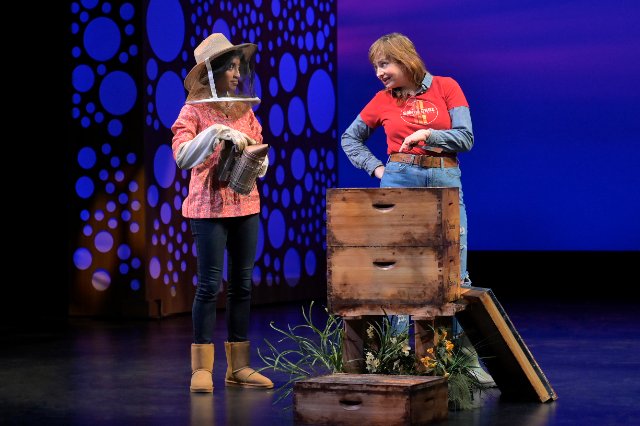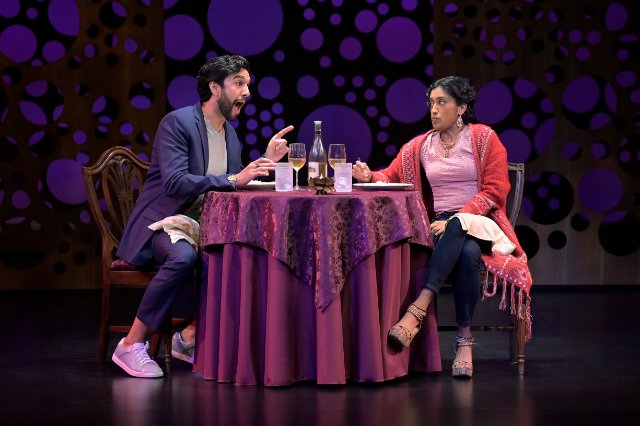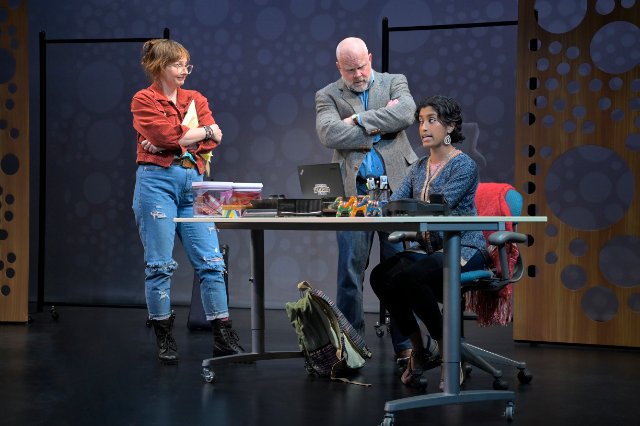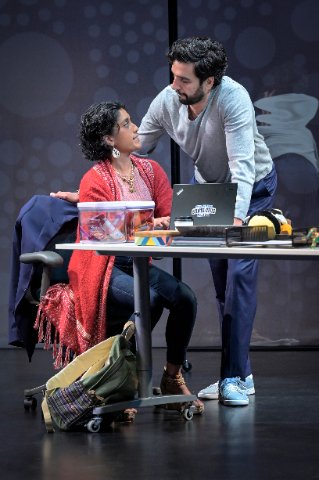Queen
TheatreWorks Fine Production About Bees and People
By: Victor Cordell - Mar 26, 2024
What motivates people to enter academe, that is, seek to become university professors? There are those who wish to be teachers of the highest order, shaping the minds of tomorrows leaders. There are those who (very naively) seek a soft lifestyle with short working hours and summers off. Finally, there are those who see themselves as scholars, researchers pushing back the boundaries of knowledge.
What does not drive the academic career choice is love of money. Even those academic fields that demand much higher pay than the norm can in no way compete with the private sector for financial packages. But in the reality of becoming adults, probably with mortgages to pay and families to care for, financial exigencies emerge. Those who have sought the research route in academe find that financial reward and adulation correlate highly with research achievement.
Playwright Madhuri Shekar exposes the pressure to publish in her compelling fictional drama “Queen.” Two research assistants at University of California Santa Cruz in 2017 have spent six years researching colony collapse disorder (CCD), or the extinction of beehives and their resident bees. While much academic research adds little value to the lives of human beings, this lengthy study has mammoth implications, as the bulk of the world’s food chain depends on the work of bees. Anecdotal evidence and the researchers’ first several data studies point to the chemical neonicotinoid, and particularly the products of the environmentalists’ whipping boy, Monsanto.
Though good friends, the assistants are chalk and cheese. Ariel Spiegel is played as fun loving and effusive by Kjerstine Rose Anderson, while Sanam Srinivasan is played with caution and concern by Uma Paranjpe. Central Valley bred, Ariel is the only researcher in the field who comes from an apiculture background, though her family lost their small business, and she is of limited means. She is a single mom who has sacrificed marriage to stay in this study and notes “Who am I without this work?”. Sanam is Indian, from wealth, and her specialty is statistical modeling rather than the content area of the research. Still single, she comes from the tradition of arranged marriage.
The women’s paper on the findings is to be published in the scientific journal “Nature,” and their professor, Dr. Philip Hayes (Mike Ryan) is set to receive an award because of the study. But “Nature” had asked for one more experiment, and this one has not conformed to previous findings to the extent that the overall findings are now insignificant. Conflict emerges as Ariel, who is wholly invested in this study and this content area, believes there must be a way to present the data favorably, as government policy will be influenced by it. Sanam believes in the sanctity of the modeling. Anderson demonstrates her rage and passion, while Paranjpe shows her reserve.
The play opens as a comedy and turns largely to drama as the women’s positions diverge, a switch that both women handle well. As Dr. Hayes, Ryan, also shows different sides of his personality as he is poised for professional recognition. Supportive and jocular at first, he then strikes what seems to be a bulldog-like, edgy, demanding “just get it done” posture in the manner of a Godfather-type who leaves no paper trail or fingerprints. What is he really saying?
The X factor is Arvind Rangarajan, a potential arranged match for Sanam. As Arvind, Deven Kolluri chews the scenery with his narcissism, pompousness, and flippancy. A New York financial derivatives trader and high stakes poker player, he assumes that marriage is a done deal, proceeding with self-indulgent expectations and denigration of Sanam’s poorly-remunerated work. But Arvind is also a statistical modeler, and in this capacity, he introduces a technique that might show the experimental results in a better light, though the procedure is of dubious validity and integrity.
Several further twists take place adding to the dramatic uncertainty. The narrative totally engages the audience, and the production is top notch with great performances on a schematic set by Nina Ball and directed by Miriam A. Laube. At one level, the play concerns personal values that drive us, and at another it deals with making and sustaining relationships – between friends, prospective marriage partners, and mentor/mentees.
But the hallmark of the play is about the practice of science and its integrity and objectivity. The playwright questions the principles of those who do not abide by the strictures of scientific practice and method. Indeed, in real life, media reports about misrepresenting the results of studies, or worse yet, forging data, are disheartening. However, exploitation and sensationalism bias should be recognized. It is only the exceptions that are newsworthy and gain the public’s attention, not the overwhelming abidance with proper practice.
The depicts research issues with great skill, but it contains a fair bit of technical matter that will be lost on much of the audience. They undoubtedly do get the overarching issues. One particular issue that gets passing mention in the script deserves discussion. (If this reviewer’s credibility on the following matter is in question, I do have a PhD and was a professor who published over 40 peer-reviewed research papers using statistical methodology).
The probabilistic method that calculates the statistical likelihood of a hypothesis being true is derived scientifically. The statistical matter of concern in this play is that after the last data collection that overall test results no longer met the .05 alpha value, a measure that means that the findings from the study are 95% likely to be true. The problem is that the .05 threshold is totally human-selected and arbitrary. Why shouldn’t the passing mark be .01 (99% likely true) or .10 (90% likely true)? Why would the 90% likelihood that neonicotinoids cause CCD be inadequate but a 95% likelihood be accepted as rock solid? There is no scientific answer. As a footnote, however, the EPA instituted various bans on neonicotinoids starting in 2019.
“Queen,” written by Madhuri Shekar, is produced by TheatreWorks Silicon Valley and plays at Lucie Stern Theatre, 1305 Middlefield Road, Palo Alto, CA through March 31, 2024.





